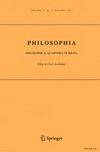权力的困境
IF 0.5
4区 哲学
0 PHILOSOPHY
引用次数: 0
摘要
我在这里所说的权威困境是指,当一个人应该服从权威,一个人应该按照更重要的理性要求行事,一个人可以二者兼顾,一个人不能二者兼顾。对于那些拒绝接受合法权威的人来说,这种两难困境并不存在。在接受合法权威的人中,包括约瑟夫-拉兹在内的一些人假定冲突可以在没有剩余的情况下得到解决。在本文中,我认为,在这种道德冲突中,当行动的理由之一被击败但没有被取消时,为没有做应该做的事而感到遗憾是合理的。本文章由计算机程序翻译,如有差异,请以英文原文为准。
The Dilemma of Authority
What I refer to here as the dilemma of authority arises when one ought to defer to authority; one ought to act as the more weighty reason demands; one can do either; one cannot do both. For those who reject the possibility of legitimate authority, the dilemma does not arise. Among those who accept legitimate authority, some, including Joseph Raz, presume the conflict can be resolved without remainder. In this paper, I argue that, in a moral conflict of this kind, when one of the reasons for action is defeated but not cancelled, it is rational to feel regret for failing to do what one ought to do.
求助全文
通过发布文献求助,成功后即可免费获取论文全文。
去求助
来源期刊

PHILOSOPHIA
PHILOSOPHY-
CiteScore
0.90
自引率
20.00%
发文量
141
期刊介绍:
Founded in 1971, Philosophia is a much-respected journal that has provided a platform to many well-known philosophers, including Kenneth Arrow, A.J. Ayer, Roderick Chisholm, Bas van Fraassen, William Frankena, P.T. Geach, Alan Gewirth, Jaakko Hintikka, Richard Popkin, W.V.O. Quine, Gilbert Ryle, Marcus Singer, Peter Singer, J.J.C. Smart, P.F. Strawson, and many others. Philosophia also published papers of Ludwig Wittgenstein and Rudolf Carnap.
Philosophia is an international journal in scope, submissions and readership. The journal publishes contributions fitting within various philosophical traditions, but manifests a preference of the analytic tradition in the broad sense of commitment to clarity and responsibility.
Besides papers in the traditional subfields of philosophy and its history, Philosophia also publishes work on topical subjects such as racism, silence of God, terrorism, the nature of philosophy, emotion, AIDS, scientific discovery, punishment, modality, and institutional theory of art.
Philosophia welcomes a wide range of contributions to academic philosophy, covering all fields of philosophy. Contributions to the journal may take the form of topical papers, philosophical surveys of literature, symposia papers, short discussion notes, puzzles, profiles, book reviews and more extensive critical studies of new books. The journal includes a ''books revisited'' section where a book and its impact are reconsidered a decade or more after its appearance. Double-blind review procedure The journal follows a double-blind reviewing procedure. Authors are therefore requested to place their name and affiliation on a separate page. Self-identifying citations and references in the article text should either be avoided or left blank when manuscripts are first submitted. Authors are responsible for reinserting self-identifying citations and references when manuscripts are prepared for final submission.Please read our Editorial Policies carefully before you submit your paper to this journal https://www.springer.com/gp/editorial-policies
 求助内容:
求助内容: 应助结果提醒方式:
应助结果提醒方式:


